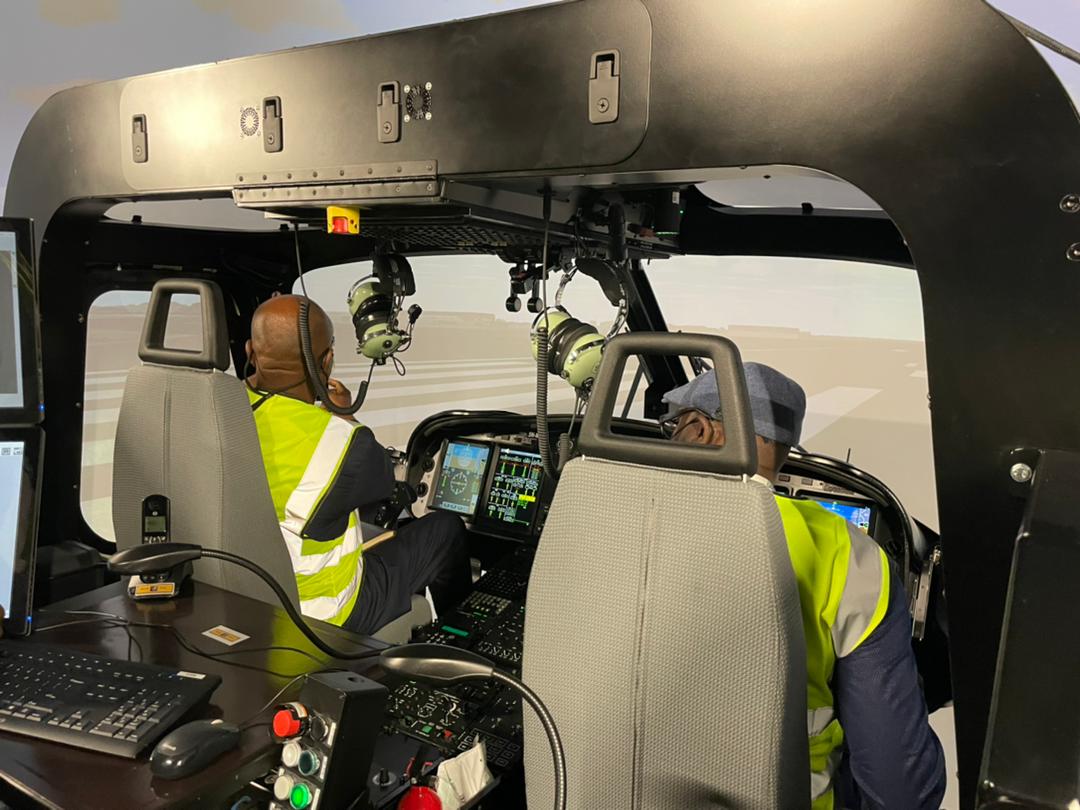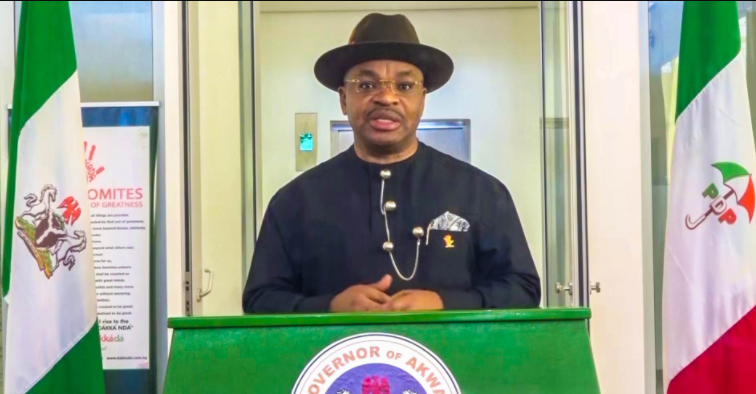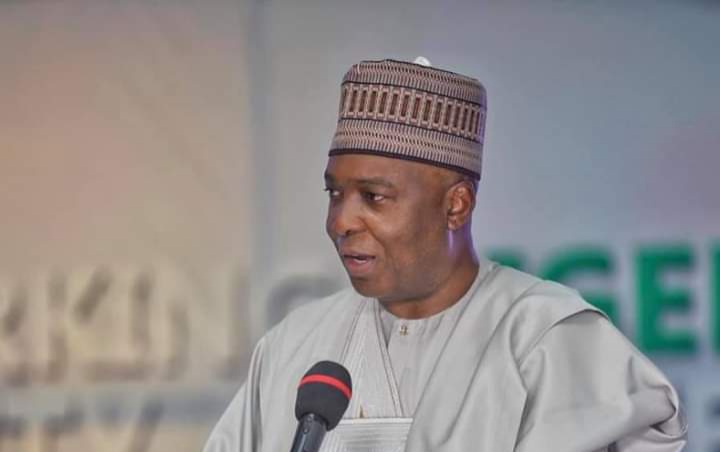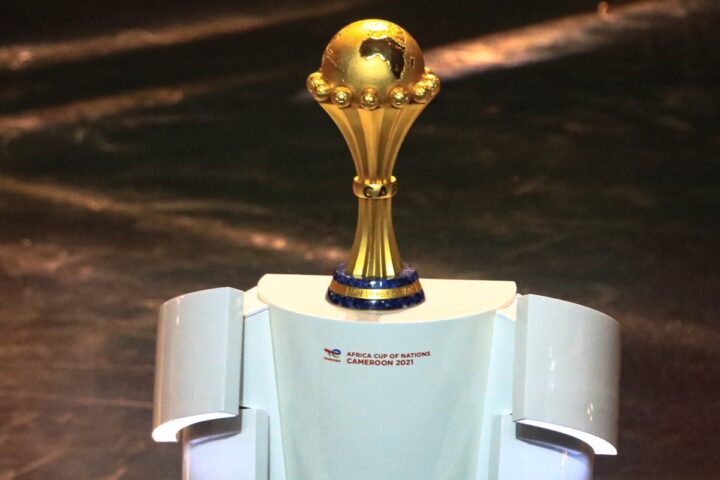Simon Kolawole, right, captaining the simulated helicopter fight along with Waziri Adio, his co-pilot, at the Caverton Aviation Training Center in Lagos on February 3, 2022
Have you flown an aircraft before? I just did. At the first attempt, I was nervous and crashed as I tried to take off. I laughed, shrugged and gave it another try. At the second attempt, my instructor was more than impressed with my lift-off. He confessed this was a rare feat for a novice. We were soon on autopilot. But I don’t know what took over me: I was suddenly in panic mode and started imploring him to land us quickly. (Waziri Adio, my co-pilot, later reminded me that I am acrophobic — someone with excessive fear of heights). Waziri took command and made an impressive approach to landing, but he descended too fast and crashed. We laughed it off as we disembarked.
“How I wish that in real life, you could crash an aircraft and start laughing, and everybody would walk out of the wreckage without a scratch,” I told Captain Kunmi Ojediji, the instructor. He laughed. The experience felt so real — it was as if I was actually in the air. That was why I panicked. Mr Olabode Makanjuola, the executive vice-chairman and CEO of Caverton Offshore Support Group Plc, also had a good laugh. But he had other reasons to be happy. This is Caverton’s brand-new Reality H full-flight simulator, configured for the AW139 helicopter, the dominant aircraft in its fleet which can fly 12 passengers at full speed. The simulator can be retrofitted to serve other aircraft types.
The helicopter level D full-flight simulator — the first and only of its kind in the whole of Africa — is located at Caverton’s new training centre at the Murtala Muhammad International Airport, Lagos. The construction of the facility, which also houses the maintenance, repair and overhaul (MRO) hangar, started in 2017 and has survived economic downturn and the pandemic to see the light of the day. For a company that commenced operations in 1999 to provide aviation and marine logistics services to businesses in the oil and gas industry in Nigeria and across West Africa, the addition of training and maintenance services to its portfolio represents a landmark leap.
Maintenance and training are major cost centres in the aviation industry. Pilots are expected to do at least two type rating trainings yearly. Those who fly more than one aircraft type do more (two each year for each type). Caverton saw the gap and has diversified while maintaining its core business. Last year, Mr Aderemi Muyinudeen Makanjuola, the chairman of Caverton Offshore Support Group Plc, told me something big was cooking at the group’s new 40,000sqm facility and asked me to do a tour. I had been looking forward to it so I could share my experience, but my work and travel schedule had been very tight. I finally created time on Thursday. I was glad I did.
Advertisement
I toured the hangar and training centre. Apart from catering to Caverton’s own fleet of 28 aircraft, the MRO also does maintenance for third parties, including notably the government of Republic of Benin. Also, unlike in the past when certain types of aircraft had to be crated and shipped abroad for maintenance, Caverton can now do the entire overhaul locally. The MRO can handle all the checks — A, B and C. They can dismantle, repair and reassemble aircraft. Olabode, the CEO, told me that they are currently focusing on rotary wings but hope to expand to fixed wings later. They stock parts from original equipment manufacturers and are hoping to have a stock of at least $5 million, he said.
This maintenance turn-around time is further expedited by the location of an export free zone and bonded terminal within the facility. The hassles of ports processes and customs clearances have been abridged and this means a lot for MRO. More so, a maintenance that could take up to four months to do abroad can now be done locally in three weeks. The facility is equipped with all the needed manpower and tooling. The CEO said it now costs roughly 40 percent less to do maintenance locally compared to going abroad. They are focusing on rotary wings for now, but they hope to expand to fixed wings later, which means extending MRO services to virtually every type of aircraft.
But the sweetest part for me is that the facility also serves clients from outside Nigeria. I just love it. You may not understand me. When I started writing the series on “Made in Nigeria, Enjoyed Worldwide” in 2005, my aim was to celebrate, from time to time, the good things coming out of our beloved country in spite of our poor image. I expressed a desire that one day, “Made in Nigeria” would be enjoyed “around the world”. I celebrated the feats of Dr Mike Adenuga’s Globacom, which was breaking new grounds in Nigeria. I desired to see Glo all over Africa and worldwide. I hoped to see Dangote spaghetti in European supermarkets. I wished to see Zenon computers globally.
Advertisement
Along the line, Nigeria got overwhelmed by political and security challenges and my enthusiasm dwindled. But, thank God, “Made in Nigeria” did not dwindle. Against all odds, our fintech companies such as Interswitch, Paystack, Flutterwave and Systemspecs are flourishing at the speed of light. Mrs Amina Mohammed at the UN, Dr Ngozi Okonjo-Iweala at WTO, and Dr Akinwumi Adesina at AfDB are flying our flag high. Our Afrobeats artistes are setting the world on fire — and with plenty awards to boot. In the midst of the ocean of negative news about terrorists, bandits, criminal herdsmen, secessionists and economic hardship, any bit of good news would do for me.
Another sweet part of the Caverton story for me is the foreign exchange angle. For those interested in the gospel of conserving forex, this offers some comfort. Although the spare parts are produced and shipped from abroad by the manufactures, certain forex expenses are eliminated, such as travels and associated costs. For the training centre, Nigerians often go for flight training abroad, at almost always fully booked facilities. They could be allotted 2am slots for flight lessons and under weather conditions that are not similar to Nigeria’s. We have two seasons while many countries have four. Plus, add the costs of foreign trips to train or retrain pilots abroad. It is not chicken feed.
“We used to spend $3 million yearly training our own pilots abroad,” the Caverton chairman told me over the phone after my tour. “Cost of training, tickets, accommodation, logistics and all. That is eliminated now.” That may sound like a good development to him, but Nigerians do not joke with their dollarised allowances, so they may not be excited. They wouldn’t mind training at 2am in Dubai and under strange weather conditions as long as they would be able to smile to the bureau de change on their return. Jokes apart, I am happy that we are seriously building local capacity. “With our facilities,” the chairman said, “we will be earning forex as clients come from all over Africa.”
Already, the MRO and the training centre are providing services to the Nigerian government, which is good news to me. According to Caverton officials, the MRO facility has done maintenance for some aircraft owned by the federal government as well as the police, while the CATC has trained pilots for the Nigerian Navy helicopter fleet. “We are proud to have the Nigerian Navy as the ‘Launch Customer’ for our AW139 Full Flight Simulator,” Caverton tweeted in November last year, same month the simulator got the European Union Aviation Safety Agency (EASA) certification. It is rated as the world’s most advanced commercial helicopter simulator. More simulators are in the plans.
Advertisement
Now, good things cost money. The facility benefitted from an €8 million loan from Bpifrance Financement — and, pardon me, I consider that to be good news too. You would think that with all the negative vibes, raising foreign capital would be one hell of a job for any Nigerian company. It has to be said that Caverton has obviously earned its stripes over the years, but it is also a vote of confidence that Nigerian companies are still getting international funding — just take a look at how our fintech start-ups have become the darling of foreign investors. Caverton’s growth previously benefitted from the presidential aviation intervention fund which it says it has fully paid back.
Caverton — which the chairman named after his best friend in his undergraduate days at the University of Leicester, UK — has quite an interesting story. Although it had broken into public consciousness when it started offering air shuttle from Ikeja to Victoria Island, both in Lagos state, around 2006, Caverton would cause a major upset in oil and gas logistics business when it defeated a foreign company to win the contract to provide helicopter services to Shell Nigeria. This was in 2010. The foreign company had enjoyed absolute monopoly at Shell and it was something of a shock when an “upstart” Nigerian company upstaged them in a competitive bid. There was a back story.
In an interview last year, Mr Babs Omotowa, former managing director of the Nigeria Liquefied Natural Gas (NLNG) Ltd, confessed that the award of the contract to Caverton while he was at Shell was “the biggest risk of my career”. He said: “We were working with these local companies and two of them really took the challenge. They found partners in Denmark and Canada, and started to develop their management systems, their technical capabilities. At some point, we felt that they had really started to have the kind of capacity that we could make use of.” He got Shell technical authorities to audit them. They came from the UK, assessed the companies and passed them fit.
They went for a tender and the foreign company, facing competition for the first time, lost. Omotowa revealed that his boss, who had just joined the company while they were processing the contract for Caverton, quizzed him on the risk of engaging a local company with no previous experience in the oil and gas industry. Concerns were raised by the aviation team at the head office, with a warning that the move “can be a career-ending decision”. Nevertheless, Omotowa kept faith. He even stretched his luck much further by asking Shell to secure an $85 million loan for Caverton to purchase its own helicopters rather than lease aircraft for the seven-year contract. Extraordinary.
Advertisement
“Of course, when I first brought the proposal, again everybody refused. The finance team in the head office refused and I justified why we had to lend them (Caverton) money. One, it was for our own safety. Two, we had committed, as a company, to develop local capacity, we had local capacity development policy, so why not put our money where our mouth was?” he said. They told him it was unprecedented for the company to lend money to a contractor — and in Nigeria for that matter. Omotowa told them there would be a bank guarantee in place. Caverton did him proud. There was no incident or accident in the life of the contract and the company paid back the loan in full.
Today, Caverton’s clientele includes ExxonMobil, Total, Chevron, Amni Petroleum, Pacific Drilling, GE and NNPC — in addition to Shell. It controls over 80 percent of the offshore oil and gas helicopter services market. However, Caverton’s clients do not have to worry about me — I would not be flying any of those helicopters anytime soon. I am acrophobic. I can’t be a pilot — except inside a simulator where all you do is joke and laugh if the aircraft crashes. At the end of the tour, I felt proud as a Nigerian. I mumbled to Waziri that Caverton should be a poster boy for our government, to be marketed to other African countries with enthusiasm. Made in Nigeria should be enjoyed worldwide.
Advertisement
AND FOUR OTHER THINGS…
CAT AND MOUSE
The All Progressives Congress (APC) has finally fixed its national convention for February 26 to elect members of the national working committee. This means a lot ahead of the 2023 elections. The ultimate prize is the presidential ticket. The power blocs would aim to install their associates in important party positions. Those who lose out would begin to assess their options. Depending on how APC handles the fall-outs from its convention, the Peoples Democratic Party (PDP) would be watching closely, hoping to benefit from expected cracks. From a distance, I can smell that PDP is also waiting to see where APC’s presidential ticket would go before making its own moves. Intrigues.
Advertisement
UNCIVIL DEFENCE
As a bill seeking to scrap the Nigeria Security and Civil Defence Corps (NSCDC) and transfer it to the police was being considered by the house of reps, Shina Peller, the sponsor, got a “love letter” withdrawing NSCDC officers attached to him. This was to make a point but the decision has now been reversed. Truth be told, NSCDC should be a police unit. But we are compulsively obsessed with creating new bodies every day — despite the glaring fact that government is short of funds. Only God knows how many universities and parastatals we have created in the last five years without a care about how to adequately fund them in a country perpetually running budget deficits. Nigeria!
Advertisement
EGYPT OR SENEGAL?
The Africa Cup of Nations will end today with the final match between Egypt and Senegal. It is ironic that Egypt lost their first match to Nigeria and are now in final while we lost to Tunisia in the second round. The Super Eagles were clearly outfought and outthought by the Tunisians, and the red card to Alex Iwobi effectively sapped our reserve energies. For a country that always needs a scapegoat, President Muhammadu Buhari was held responsible for the loss because of his pre-match phone call to the team. Egypt, meanwhile, will fancy an eighth title. Senegal will be aiming for a first. For that reason, and for the sake of West African solidary, my head gives it to Senegal. Sentimental.
AND FINALLY…
Six months after being arrested and detained by Beninese authorities, Sunday Adeyemo aka Sunday Igboho is about to regain his freedom — supernaturally. Or so Agbekoya Worldwide has threatened. The Yoruba Nation campaigner, who supposedly wields supernatural powers, was arrested at an airport in Cotonou in July 2021 on his way to Germany allegedly on a fake passport, with the original already seized by Nigeria’s secret police. Kamorudeen Okiki, president of Agbekoya Worldwide, an organisation also reputed as having supernatural powers, has now threatened the Beninese authorities to release Igboho or he would be freed with juju. What took them so long? Comical.
Add a comment





